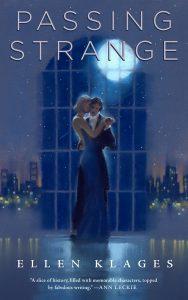 Amazon Affiliate Link | Bookshop.org Affiliate Link
Amazon Affiliate Link | Bookshop.org Affiliate Link Passing Strange is a novella that feels like it has it all: a bit of mystery, a lot of history, and just a hint of magic. A queer love story set mostly in 1940 San Francisco, the book opens with Helen Young, and elderly woman who has just a few errands to run before her life is over. As she finishes these and her life comes to a close, we drift back to when she was a young woman-and unravel some of the mystery surrounding her final actions.
This novella reads like a love letter to San Francisco, and the setting feels vibrant and clearly well researched. The plot mostly revolves around the romance between two creatives: Haskel, the visual artist who paints covers for pulp novels; and Emily, a singer at the lesbian nightclub Mona's. They also spend their time in Chinatown, climbing the steep streets of Nob Hill, and visiting the World's Fair, as Haskel and Emily melt together in a passionate romance. Helen is there too, of course, as are a few other queer women who enjoy throwing dinner parties, but they are all secondary characters to Haskel and Emily's exploration of the city. While there is a lot of love for San Francisco in the novel, it clearly isn't perfect, as we still see the prejudices of the time: Mona's is a lesbian nightclub, sure, but it also acts as a tourist destination, where straight white couples come to be scandalized by the unnatural acts of its target patrons. Similarly, Helen is a lawyer who can't get clients because she is a Chinese American woman, so she dances with her (beard) husband at the Forbidden City, which plays up American interests in Orientalism. All the characters both rely on and resent the tourists, as well as the stereotypes they have to perform in order to pay rent.
While I did enjoy the romance between Haskel and Emily, I was a little disappointed with how little the side characters are really involved in the story. The book opens with Helen, and she feels like the most interesting character to me, but she mostly spends her time off doing other things while Haskel and Emily go on dates and get to know each other. Then there are Franny and Babs, whose names I can hardly remember as they are only in a few scenes in the book. After such a strong opening with Helen, the ensuing domestic romance felt like a bit of a letdown-again, it was a very nice romance, but I was expecting something grand and mysterious, and I got a fairly standard romance that was like Carol, but set in San Francisco and better.
And then there's the magic. I have mixed feelings about the magic in this story, and I think the shortness of the novella might influence a lot of it. Franny does fold maps to create shortcuts around the city, but they explain that magic is difficult, and needs to be very precise, like a complex mathematical equation. Magic is only used three times throughout the whole book, and twice are at the very end; the first usage introduces it and allows the characters to discuss it a bit. That makes this book feel less like a fantasy and more like a historical fiction that just has a magical deus ex machina so that the characters can escape the trouble that they got into at the end of the book. Now, given that the magic doers themselves talk about how this isn't something everyday, and the magic is often small and unnoticeable to anyone not directly involved in it, there really isn't enough room in a short book like this for there to be a lot of magic. So it does make sense in universe as to why there is so little actual magic use in the book. But I was drawn to this book because of the fantasy elements, and if I didn't like historical fiction, it would have been a bit of a letdown.
This was an enjoyable read, and I would recommend it to anyone looking for a sapphic historical fiction that is short and sweet, with just a sprinkle of magic. However, I doubt I'll be revisiting it. I do have a lot more opinions about the ending, so highlight below for spoilers!
I appreciate the open ending, where we don't actually know whether or not the big magic works (but assume it does). But I have...a lot of questions about even the presumed happy ending. Nitpicky, perhaps, but...what exactly happens when a singer and a visual artist emerge in modern day San Francisco? Where do they stay? How do they afford rent in one of the most expensive places in the country? They don't even know what a computer is, how are they going to make money and support themselves? I appreciate the sentiment of disappearing into a painting until you can emerge in a more accepting time, but it's also a more expensive time, and I feel like it would have been easier to just...change their names and move to New York or something.

